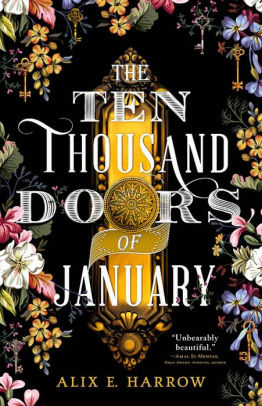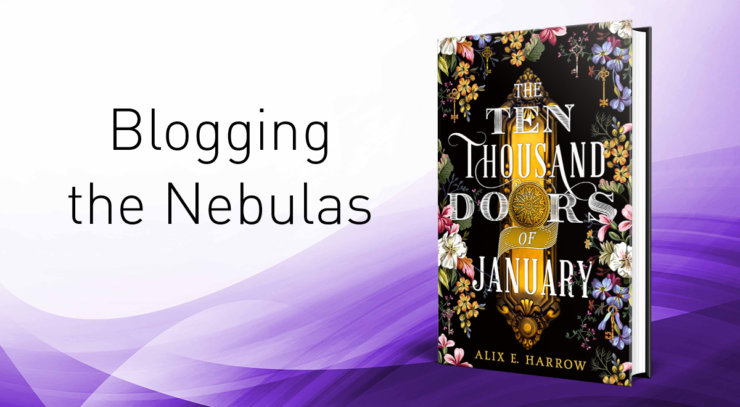The Nebula Awards could be described as the Academy Awards of SFF literature; they are voted on by the professional peers of the award nominees—members of the Science Fiction and Fantasy Writers of America. There are six nominees in the best novel category this year. All this week, I will be reviewing each of them in turn and figuring their odds of taking home the prize. Welcome to Blogging the Nebulas 2020.
The Pitch
My introduction to fantasy took place through the back of a wardrobe that opened up onto a magical land. Portals to other worlds are one of the genre’s definitional tropes, making a plot tool out of the metaphorical relationship between reader and novel: Books are gateways.
That’s the operating thesis of Alix E. Harrow’s The Ten Thousand Doors of January; its titular protagonist is a girl who enters, through a very peculiar book, into the life of Adelaide, a woman from an earlier era who discovers that some doors don’t lead where you expect. January lives in the early 20th century, a ward of the wealthy, aristocratic Mr. Locke, who employs her father as an adventurer of sorts, sending him off in pursuit of rumors of fabulous treasures. Bored with her comfortable society life, January relishes losing herself in pulpy novels, and one day comes across a strange, handcrafted volume entitled “The Ten Thousand Doors.” Assuming it is a gift from her father—who has not returned from Mr. Locke’s last mission—she begins to read.
Buy the Book


The Ten Thousand Doors of January
The book introduces a new narrative thread and a new and compelling—perhaps significantly more compelling than the wide-eyed teen January—protagonist in Adelaide Lee Larson, who lived a few decades before January was born. In chapters that alternate with January’s tale, told in the first person, we follow Adelaide’s adventures as viewed through the sort of scholarly report that makes up The Ten Thousand Doors, penned by someone who appears to be in pursuit of Adelaide and sharing her story. Said story—involving unexpected journeys, a doomed love affair, and a sinister plot to end magic—turns out to be intertwined with January’s, to her (but not the reader’s) surprise.
Given that this is a book preoccupied with the power of stories, it’s appropriate that Alix E. Harrow so clearly understands how they work. The Ten Thousand Doors of January is deftly and carefully constructed, but it doesn’t feel that way while you’re reading along: it’s more subtle, solid bones wrapped in glistening emerald skin. Intercutting the twin coming of age stories of January and Adelaide (albeit one told in a reverse order of sorts, in the case of the latter) gives the plot a narrative drive it might have lacked if solely focused on January, who is a bit too much of a teen to carry the dramatic weight her counterpart’s sad tale delivers.
It’s hard to talk about this book without mentioning the prose, which flows like a river: “It is at the moments when the doors open, when things flow between the worlds, that stories happen.” “Destiny is a pretty story we tell ourselves. Lurking beneath it there are only people, and the terrible choices we make.” “Books are Doors and I wanted out.” Harrow is able to describe the experience of reading as an escape with tactile precision. This is fantasy that feels real, because it allows us to really believe that a book can be a doorway, and that doorways can lead somewhere magic.
Why it could win
The Ten Thousand Doors of January is Alix E. Harrow’s first novel, but she’s already a familiar name on awards ballots: Her short story “A Witch’s Guide to Escape: A Practical Compendium of Portal Fantasies” won the Hugo Award and was a finalist for the World Fantasy, Locus, and—yup—Nebula awards. There’s obviously a lot of enthusiasm out there for her writing, both from readers and her fellow pros (hence the novel’s placement on both the Hugo and Nebula slates this year).
Moreover, the novel is an accessible fantasy—which is to say, not a dense volume in a multi-book epic—a form that has a decent track record at the Nebulas: see relatively recent wins for Naomi Novik’s Uprooted and Jo Walton’s Among Others. Like the latter, The Ten Thousand Doors… is a fantasy about the magic inherent in books, though perhaps in a more literal fashion; whereas Walton wrote about a lost girl finding herself in genre fiction, Harrow’s characters literally become lost thanks to a singular book. In any case, writers are apt to enjoy a novel that’s all about how putting pen to paper is a transformative and meaningful act.
This one may also win votes simply because it is so very hard to dislike. The prose sings, the characters leap from the page, and the narrative is designed to evoke maximum feels. It’s a standalone, and doesn’t leave you yearning for a sequel so much as satisfied that it doesn’t need one. It’s a complete story that ends perfectly, which may engender enough goodwill—and votes—to put it over the top.
Why it may not win
I’ve already laid out the case against debut authors taking home the Best Novel award; rather than reiterate it, I’ll just point you to the “Why it may not win” section of my review of A Song for a New Day and leave it at that—partly because, with four debuts on the ballot this year, and all of them strong contenders, I have a pretty good feeling the point is going to be moot.
That said, Harrow’s novel is a debut, and it occasionally feels like one. Though the central characters are remarkably distinct in terms of action and dialogue, the supporting ones can feel a bit sketched in and indistinct—including her villains, whose motivations and heel turns might have you scratching your head at times. The pacing is also a little lumpy, occasionally losing momentum and focus as the point of view shifts every chapter or two between January and Adelaide, rushing forward then staggering a bit, only to nearly race past the climax in its hurry to reach the happily ever after. I’m picking at the seams here—it’s still an enormously enjoyable novel, and rightly adored by enough readers that it made it deep into the Goodreads Choice Awards—but with a Best Novel ballot this strong, the smallest perceived flaws could prove to be fatal ones.
Which is a bit melodramatic, yeah: Alix E. Harrow is no doubt well pleased to have even made the ballot in a standout year for the genres, and if she doesn’t take home the award this time, well, something tells me it won’t be her last shot.
Joel Cunningham was the founding editor of the B&N Sci-Fi & Fantasy Blog (RIP), where he explored the galaxy for 5 years, picking up a Hugo Award (well, tangentially) along the way. He’s now managing editor of Lifehacker, which means he’s managing at least one thing nowadays. He lives in an apartment in Brooklyn with his wife and two children and hopes to go outside again someday. He tweets @joelevard.










